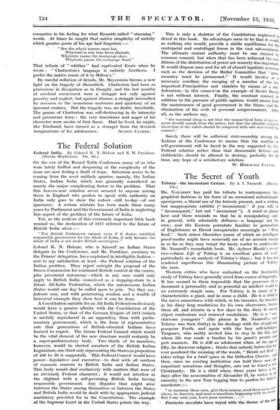The Federal Solution
Federal India. By Colonel K. N. Belmar and K. M. Panikkar. (Martin Hopkinson. 10s. 6d.)
ON the eve of the Round Table Conference many of us who were lately baffled and despairing at the complexity of the issue are now feeling a thrill of hope. Salvation seems to be coming from the most unlikely quarter, namely, the Indian States, Indian India which was generally considered as merely the major complicating factor in the problem. That this heaven-sent solution never occured to anyone among those in England who profess to speak with authority on India only goes to show the extent—still to-day—of our ignorance. A serious mistake has been made these many years by Parliament and the Government of India in neglecting this aspect of the problem of the future of India.
Yet, as the authors of this extremely important little book remind us, the declaration of 1917 referred to the future of British India alone :—
" The British Parliament cannot, even if it desire, establish responsible government for the whole of India, if only because the whole of India is not under British sovereignty."
Colonel K. N. Haksar, who is himself an Indian States delegate to the Conference, and Mr. Panikkar, secretary to the Princes' delegation, have explained in intelligible fashion— and to my satisfaction at least—the Federal solution of the Indian problem. They reject outright the proposal of the Simon ComMission for continued British control at the centre, plus provincial autonomy—which in any case could only apply to British India—conceived as a stepping-stone to a future All-India Federation, which the autonomous Indian States would one day be called upon to join. No, they say, federale now, and with penetrating wisdom and a wealth of historical example they show how it can he done. A Constitution suitable for an All-India FederatiOn obviously would have a greater affinity with the Constitution of the United States, or that of the German Empire of 1871 (which is usefully reproduced in an aiipendix), than with parlia- mentary government, which is the form of representative rule that generations of British-educated Indians have learned to expect. The future Federal Council which would be the vital element of the new structure would certainly be a super-parliamentary body. Two thirds of its members, however, would be elected members of the British Indian Legislature, one third only representing the States (a proportion of 100 to 50 is suggested). This Federal Council would have power—legislative and executive—to deal with all matters of common concern to British India and Indian States. This body would deal exclusively with matters that were of an obviously Federal character ; it would not interfere in the slightest with a self-governing British India having responsible government. Any disputes that might arise between the States among themselves or between the Statis and British India would be dealt with by appropriate judicial machinery provided for in the Constitution. The. example ' of the Supreme Court. in the United States points the :way. This is only a skeleton of the Constitution explained in detail in this book. -Its adVantages seem to be that it would, as nothing else -would,-provide a stable equilibiium for the centripetal and centrifugal forces in the vast "sub-continent. The ultimate central authority must be one created by common consent, but when that has -been achieved the con. ditions of the distribution of pciwer are scarcely less important It would dispose once and or all of absurd le&distic nonsense such as the decision of the Butlei 'Corainittee that " pan. mountcy must be paramount." It would -involve as a necessary corollary the Merging' of a number of the lee importitnt Principalities and stateleta by= means of a sul. federittionin this connexion the example 'of Soviet Russia is not without interest. Finally, the constant contact, in addition to the pressure of pablic opinion, Wciidd. ensure both the maintenance of good government in the Sintes and the elimination of the evils' of personal Misgovernment. After all, as the anthors say, • " the essential thing is not that- the monarchical form of govern. ment should vanish from the states, but that the absolute personal
discretion of the rulers should be tempered with safe and modifying counsel."
Surely there will be sufficient statesmanship among the Indians at the Conference to ensure that the realities of self-government will be faced in the .way suggested by this Federal solution rather than that democratic fictions and shibboleths should be allowed to destroy, probably for all time, any hope of a satisfactory solution.
W. HORSFALL CARTER.








































 Previous page
Previous page